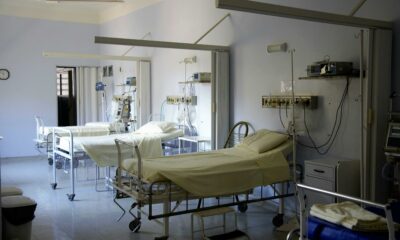News
Gauteng Hospital Food Supplier Closed After E. coli Contamination, Patients Served Limited Meals

Gauteng Hospital Food Supplier Closed After E. coli Contamination, Patients Served Limited Meals
Patients across Gauteng hospitals have been experiencing disrupted meals after a major food supplier was temporarily shut down due to E. coli contamination in its water supply. The Masakhane Cook Freeze Factory, based in Tshwane, supplies roughly 8 000 meals daily to six hospitals and 17 community health centres, but concerns over sanitation have brought its operations to a halt.
The closure has drawn sharp attention from both civil society and opposition parties, highlighting ongoing challenges in hospital food management and provincial oversight.
Patients Left With Minimal Lunches Amid Safety Concerns
Earlier this month, patients at Charlotte Maxeke Academic Hospital were reportedly receiving just a single cheese sandwich for lunch, while breakfast and dinner continued as usual. Families often stepped in to supplement meals, bringing their own food to ensure relatives were not left hungry.
Democratic Alliance Shadow MEC for Health, Jack Bloom, expressed frustration at the situation, saying, “It is shameful that a provincial food facility is closed because of contaminated food. This is due to poor management and underinvestment in new machinery.”
Health Department Responds
MEC for Health and Wellness, Nomantu Nkomo-Ralehoko, confirmed on Tuesday that inspections by the Tshwane municipality had revealed E. coli contamination in the municipal water supply feeding the factory.
“Masakhane Cook Freeze Factory will be temporarily closed,” she said, adding that no illnesses had been reported in connection with the meals. She reassured the public that alternative nutritional meal options were being provided by hospital food service teams.
The MEC also outlined steps being taken to resolve the issue:
-
Thorough cleaning of the factory
-
Installation of a new water purification plant
-
Food safety protocol training for staff
However, she did not provide a timeline for reopening. “We do not have a specific timeline as to when the cook freeze factory will resume full operations,” Nkomo-Ralehoko stated. “I want to emphasise that there are no patients who are currently starving within our health facilities.”
A Wider Problem Across the Province
The factory supplies eight thousand meals per day across multiple hospitals, including six major facilities and seventeen community health centres. The impact has been felt across the province, with families expressing frustration on social media and local community forums about patients receiving minimal or poor-quality meals.
Bloom said complaints had reached his office on 18 November, highlighting the urgent nature of the food shortage. He criticised the provincial government for poor oversight and underinvestment, suggesting that both management and equipment failures contributed to the crisis.
Safety and Oversight Are Key
The Masakhane closure serves as a stark reminder of the fragility of public food systems in healthcare facilities. While alternative arrangements are in place, hospital staff, patients, and families alike are urging authorities to prioritise food safety and modernise infrastructure to prevent similar crises.
The Gauteng Department of Health has committed to ensuring temporary measures do not compromise patient nutrition, but residents are watching closely, calling for a transparent plan and a clear reopening date.
As one concerned family member wrote on social media, “Hospitals are meant to heal, not starve. The government must do better, these are our loved ones.”
{Source: The Citizen}
Follow Joburg ETC on Facebook, Twitter , TikTok and Instagram
For more News in Johannesburg, visit joburgetc.com



























